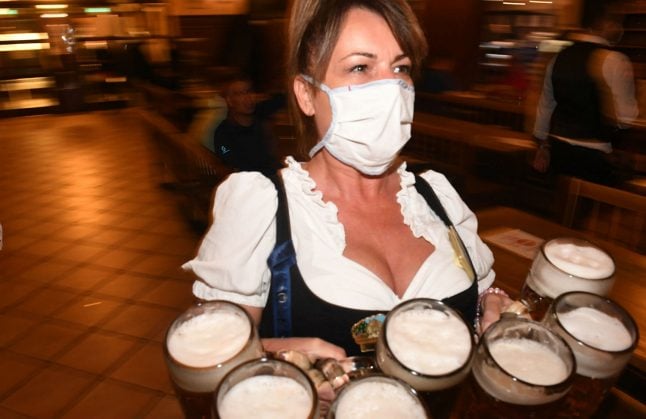“Staying indoors during the autumn and winter and the impending flu season, we must now be particularly careful,” the draft proposal to be discussed on Tuesday states.
On Monday Merkel had warned that coronavirus cases could leap to “19,200 daily” by December if swift action was not taken.
READ ALSO: Merkel warns coronavirus cases in Germany 'could leap by 19,200 daily by Christmas'
On Sunday, Germany recorded 2,507 new cases – the highest figure since April, the peak of the crisis when more than 6,000 daily cases were reported.
Over the past seven days, the country has confirmed 13,079 cases, according to figures from Johns Hopkins University.
Cap on events
The draft proposes that private events – such as weddings or birthday parties – should be capped at 25 guests and public ones at 50.
Yet the limit on participants at private events stands to vary if regional infection numbers go up.
States could issue new restrictions on the number of guests if 35 infections per 100,000 inhabitants is exceeded in a district within seven days.
If more than 50 people per 100,000 inhabitants in a county become infected within seven days, further measures will have to be adopted, the draft goes on to say.
In the most severely affected areas, there could be a cap of 10 participants in private celebrations and a maximum of 25 participants in public celebrations.
“If we all are cautious together, and accept necessary restrictions temporarily, we can save our country a lot in autumn and winter,” said Merkel spokesperson Steffan Seibert on Monday.
Wir dürfen nicht zulassen, dass das #Corona-Virus sich an einzelnen Orten wieder exponentiell ausbreitet. Wenn wir alle zusammen Vernunft und Vorsicht aufbringen und notwendige Einschränkungen zeitweise akzeptieren, können wir unserem Land im Herbst und Winter Einiges ersparen. pic.twitter.com/CBX18aHCYI
— Steffen Seibert (@RegSprecher) September 28, 2020
Rules for restaurants
Restaurants and pubs around Germany are currently required to log the details of diners for the event of an outbreak.
In order to enable correct contact tracing, the draft proposes that authorities should be able to impose a minimum fine of €50 for violations such as providing false or incomplete personal details.
In particularly affected regions, the government also wants to limit the sale of alcohol under certain conditions.
In order to minimise infections in the catering trade, “time-limited bans on the sale of alcohol would have to be introduced if the incidence of infection increases”.
Fever outpatient clinics for the autumn and winter season
In light of both the flu season and an increasing number of coronavirus infections, the proposal also advocates the use of so-called fever outpatient clinics for more widespread testing.
READ ALSO: 'Fever drop-in clinics': German Health Minister proposes new coronavirus strategy
The government will also present a plan on how to prevent overcrowding at hospitals and GP surgeries.
It also recommends that risk groups be vaccinated against the flu as a precautionary measure.
Other proposals for life indoors
Particularly in the cold season, two more factors should be part of people’s plans for reducing the risk of coronavirus infections: the Coronavirus Warn App and Stoßlüften, or opening the window completely in order to “considerably reduce the risk of infection,” reads the draft.
The paper also advocated keeping schools and Kitas open in the colder months.
“The overarching aim must be to keep schools and childcare facilities running, as well as the continued operation of the economy after the painful restrictions early this year and in the summer,” it read.
But ahead of the meeting, some state premiers have already voiced opposition to toughening measures.
Saxony state premier Michael Kretschmer said stricter rules made sense only
in places where infections are sharply rising.
“That is not an issue for Saxony. That's why there won't be toughened rules here,” he told regional radio MDR Sachsen.



 Please whitelist us to continue reading.
Please whitelist us to continue reading.
Member comments